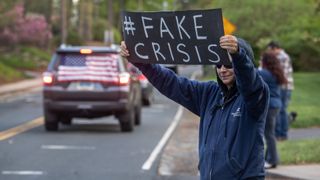
Believing in COVID-19 conspiracies may make people likelier to believe in other conspiracy theories down the road, a new study suggests.
The researchers, who published their findings Oct. 26 in the journal PLOS One (opens in new tab), suggested that thinking the number of COVID-19 deaths was exaggerated, or that China deliberately released or engineered the virus for nefarious purposes, is a kind of gateway drug to other conspiracy theories.
Conspiracy theories hold that shadowy groups are secretly masterminding large-scale plots that affect the public. They range from the belief that aliens on UFOs create crop circles to the wild and unfounded idea that the moon landing was faked.
Conspiracist beliefs tend to be rooted in a feeling of losing control or being uncertain, Live Science previously reported.
RELATED: When did Democrats and Republicans switch parties?
Therefore, the COVID-19 pandemic was the perfect storm for generating conspiracy theories, the research authors suggested.
"The widespread damage created by the COVID-19 pandemic has heightened people's anxiety, uncertainty, feelings of powerlessness, and has created friction between members of different social groups," the researchers wrote in the study. "Such conditions represent a near perfect recipe for the proliferation of conspiracy theories."
In the new study, the researchers looked at two surveys. In the first, they surveyed roughly 500 people in the U.S. in June 2020, asking participants about their conspiracist beliefs in general and their belief in COVID-19 conspiracy theories in particular. The study authors then followed up with those people six months later.
The participants who believed that "COVID-19 was intentionally brought into the world for dark purposes" or that "the severity of COVID-19 was exaggerated" were more likely to believe that the 2020 U.S. presidential election was riddled with fraud or to espouse other theories, such as that “some UFO sightings and rumors are planned or staged in order to distract the public from real alien contact.” This correlation held even when the researchers controlled for baseline political orientation.
In the second survey, the researchers asked more than 2,000 people in the U.K. to rate how much they agreed with the following statement: “I think that many very important things happen in the world, which the public is never informed about,” as a proxy for their tendency to believe in conspiracy theories. At a second point in time, they asked people to endorse their belief in COVID-19 conspiracy theories.
They then asked participants the first question in several waves over time. Just as in the first survey, belief in COVID-19 conspiracy theories predicted a later rise in general conspiracist thinking.
The findings support the notion that conspiracy theories about COVID-19 can act as a gateway to additional outlandish beliefs, but further research should assess if the same effect holds true for other conspiracy theories, such as the notion that the 9/11 attacks were faked, the study authors noted.
Live Science newsletter
Stay up to date on the latest science news by signing up for our Essentials newsletter.

Tia is the managing editor and was previously a senior writer for Live Science. Her work has appeared in Scientific American, Wired.com and other outlets. She holds a master's degree in bioengineering from the University of Washington, a graduate certificate in science writing from UC Santa Cruz and a bachelor's degree in mechanical engineering from the University of Texas at Austin. Tia was part of a team at the Milwaukee Journal Sentinel that published the Empty Cradles series on preterm births, which won multiple awards, including the 2012 Casey Medal for Meritorious Journalism.
Most Popular

By Harry Baker

By Ben Turner

By Jamie Carter